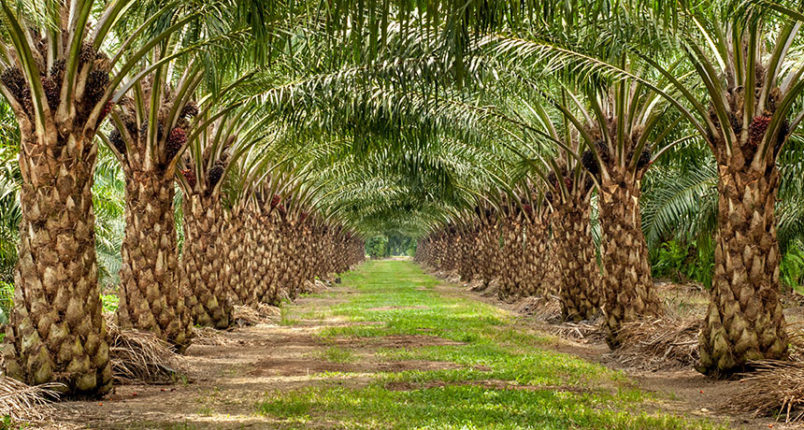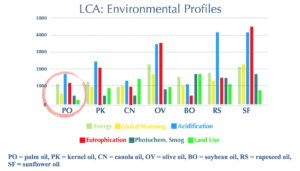
The claim “palm oil-free” aims to make the consumer believe that they are buying a more sustainable product. But is it true?
To verify this, we analyzed several authoritative independent scientific studies commissioned by international bodies, governments, and Life Cycle Analysis (LCA), to measure the sustainability of some of the vegetable oils most often used in food production.
Palm oil was revealed to be the most sustainable.
For more information, the full report is available here.
Competing crops against Palm Oil have a more significant impact on the environment and biodiversity. For example, the yield per hectare of Palm Oil is very high: about 3.8 tons per hectare (t / h). While the yield of alternative oils is much lower: 0.8 t / h for rapeseed oil, 0.7 t / h for sunflower oil, 0.5 t / h for soy oil (WWF 2016 data).
Furthermore, the production of palm oil occupies 6% of the land used for the production of vegetable oils but is able to satisfy 38.7% of the global demand. Soy, for example, occupies 40% of the world agricultural area dedicated to vegetable oils but only produces 22% of the total oil output. This means that palm oil has the opportunity to reduce land usage needed to produce oils and fats, thus to protect the environment and biodiversity.
We also considered two comparative Life Cycle Assessments (LCAs), that examine various vegetable oils. The LCA is an analysis that measures the effects on the environment associated with a given product in each phase of its life cycle. In the LCAs examination, palm oil is better than its alternatives concerning the overall environmental impact, especially if we consider the parameters: energy used, greenhouse gas emissions, photochemical smog, and land use. These results are made more apparent in the figure below.
Figure 1 – LCA comparison of vegetable oils

Source: Dumelin 2009
Palm Oil not only acts to promote economic and social development in developing countries, but it also helps to promote sustainable development. The rules and regulations about palm oil, specifically those given by the RSPO, are specific and constantly under scrutiny. Because of this, the regulations are constantly improving and providing better protection, despite that, compared to other oil supply chain regulation schemes, it is already the best and most sustainable.
Citizens must support the growth of the palm oil industry to better protect biodiversity and our planet. Avoiding such a critical product will lead to larger amounts of deforestation, biodiversity loss, and climate change.
Citizens have the right to be informed about products and decide which to buy based on empirical evidence.
Help us stop the negative trend of boycotting palm oil; spread the news of its sustainability.
